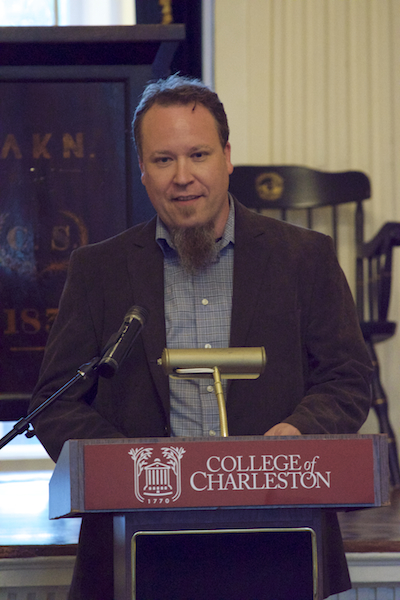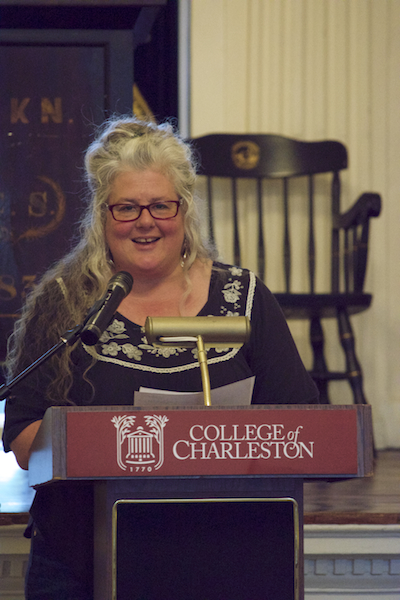
Dana Levin: Crazyhorse Reading
April 18, 2017 | news, readings

With a mane of wavy, silver blonde hair framing her smiling face, Dana Levin stands in front of a crowd at Randolph Hall, lifts her phone to take a picture, and says, “One, two, three, Poetry!” She immediately puts her audience at ease and seems to relax into herself as she explains that her latest collection, Banana Palace, “came out of feeling deep anxiety about the future… Do you know what that’s like?” she asks, her tone both forthright and empathetic, smiling at the crowd composed mostly of undergraduate students.
Without further ado, she begins her readings with “Fortune Cookie,” a short two-line poem that reads, “You can never get death out of your system,” which she considers a “prevailing motto” for Banana Palace. She reads poems that take on the complexities of the modern world and presents them with wit, sly humor, and an unassuming optimism.
As CofC MFA student Josh Lowder said in his introduction, Levin’s lines evoke reflecting images of both the contrary nature of modern society and “a grim glimpse of what lies in the  not-too-distant horizon of a future generation.” And they do, moving from the Greek underworld, to the modern classroom, to the rise of digital technology, to the definition of a soul, to her father as butcher, to the necessity and destructive nature of food.
not-too-distant horizon of a future generation.” And they do, moving from the Greek underworld, to the modern classroom, to the rise of digital technology, to the definition of a soul, to her father as butcher, to the necessity and destructive nature of food.
For “Across the Sea,” she explains how she and her students were reading a book about the underworld and discussing the soul when she came up with the idea for them to use their phones to look up the definition of “soul.” Levin says, “They’re holding this phone looking really deep into the phone, looking at this definition of the soul, which is this ineffable thing you can only theorize about, and they’re holding their phones above a physical book that has poems in it that feature a figure that comes from pre-literature culture because Persephone exists as a figure before people were writing. In that moment, time and space just collapsed, and I wrote a poem.” Within the same poem is Marconi, Christ’s cry on the cross, and the sibyl, all concepts Levin seamlessly weaves together in the lyric. The reader is transported into a dream world of surreal spirituality, questioning the connections among our world, our souls, and our futures.
She reads from a poem in which she is a guest on “a series of strange talk shows.” In a voice that exudes insincerity and flashiness, she reads the part of the host and asks, “Soooo… Oxygen. How’s that feel?” The poem’s plot is light-hearted, humorous, satirically mocking modern-day T.V. show fascination with bodies, but it ends maliciously: “you lean forward smiling, your skull-eye gleams, you stick your black-boned finger right down my throat.” Our laughter, thwarted, suddenly challenged by the aggressive, invasive gesture.
Before reading “Urgent Care,” she confesses that the plot of the poem is complicated. She laughs and says, “If you brought this to a creative writing class, I’d be like, ‘I don’t know. This plot seems kinda busy.’” It is, but once more, Levin traces the pathways, letting us linger on the connections between waiting for help, our interactions with technology, and the universe beyond with a lunar eclipse. She leads us through a series of narratives that call forth our own anxieties, our marveling at our human cost.
The title poem is one that best reveals the collection’s perspectives on human complexity. Levin explains the inspiration for this poem came from an image she saw while scrolling through Facebook. “I wanted to write about it, but I didn’t know how to write about it without having to write about finding it on Facebook. The idea of writing a poem about Facebook just seemed very dismal, so I let it go for a year hoping that the muse would oblige.”
She explains her inspirational process as a conversation with herself:
“Oh, I really want to write about this image. Ok. You’re gonna have to write about Facebook.”
“Ok, but like why? Why would you do that?”
“Well, I guess I would do it for people who don’t know what Facebook is.”
“Who doesn’t know what Facebook is?”
“Obviously someone who is born after the apocalypse and doesn’t know this technological world that we live in.”
 Levin adds how she realized she could then write this poem from the perspective of someone who has “lived in a world like ours and has somehow survived civilization’s collapse and is now living in this post-collapsed world and is trying to describe what this world was like via talking about Facebook.” Thus, “Banana Palace” is read, the poem addressed to “future person.” Yet as she reads, we feel she is truly speaking to a different audience, to us, revealing our complicity, asking us to examine it like the speaker does with the image of the “cross section of a banana under a microscope.”
Levin adds how she realized she could then write this poem from the perspective of someone who has “lived in a world like ours and has somehow survived civilization’s collapse and is now living in this post-collapsed world and is trying to describe what this world was like via talking about Facebook.” Thus, “Banana Palace” is read, the poem addressed to “future person.” Yet as she reads, we feel she is truly speaking to a different audience, to us, revealing our complicity, asking us to examine it like the speaker does with the image of the “cross section of a banana under a microscope.”
She finishes reading her last poem and invites the audience to questions. We are eager to oblige. When she’s asked about choosing poetry as a career, her response is candid, but encouraging. “It just happened. It made my mother really nervous. I think if you’re called to an art form and you can’t help it, you should not try to help it. You should just do it.”

